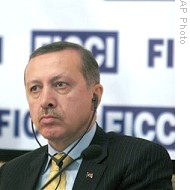voa标准英语2008年-New Joint Project Explores Plan to Pipe Oil, Ga(在线收听)
Petroleum officials from India, Turkey and Israel will meet next month to discuss a project to transport oil and gas to India using a combination of pipelines and supertankers running between the three countries.
 |
| Turkish Prime Minister Recep Tayyip Erdogan looks on during luncheon meeting with members of Federation of Indian Chambers of Commerce and Industry in Bangalore, 24 Nov 2008 |
The plan was discussed by Indian and Turkish officials during a five-day visit to India by Turkish Prime Minister, Recep Tayyip Erdogan.
Wrapping up the visit Monday, Mr. Erdogan told business leaders in Bangalore that the proposal will give India easier access to energy supplies from Central Asia and the Caspian region.
The oil and gas will be carried via a pipeline from the Caspian region to the Turkish port of Ceyhan. The supplies will then be taken via supertankers to Israel, fed into pipelines running to Israel's Eilat port, and finally make their way to India via the Red Sea.
An analyst at the Indian Defense and Strategic Institute in New Delhi, Shebonti Ray Dadwal, says the proposed route carries many economic and political benefits for India.
"It is going to be cheaper if the oil comes via the Red Sea, as the pipeline will allow it to," he explained. "I believe it is going to be four dollars a barrel cheaper to transport it through the pipeline. Also politically it will allow us to avoid the Suez Canal and Strait of Hormuz… In the event of a war that is going to be blocked. This is an alternative route."
India is heavily dependant on oil imports, and worries that any instability in the Middle East region could disrupt supplies of oil to the country.
Those concerns have prompted India to look for both alternative sources and alternative routes to ensure the smooth flow of its massive energy requirements.
The new route via Turkey and Israel is being discussed at a time when there has been virtually no progress on a long-pending proposal to build a massive gas pipeline between Iran, Pakistan and India.
India has been moving slowly on that project because of strong security concerns over much of the area that the pipeline will travel through. The United States has also strongly opposed the project.